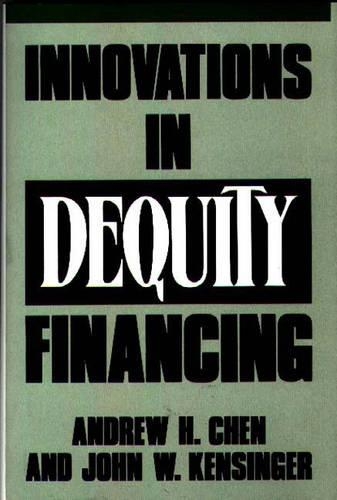
Innovations in Dequity Financing
(Hardback)
Publishing Details
Innovations in Dequity Financing
By (Author) Andrew H. Chen
By (author) John Kensinger
Bloomsbury Publishing PLC
Praeger Publishers Inc
30th August 1991
United States
Classifications
Tertiary Education
Non Fiction
Budgeting and financial management
658.1526
Physical Properties
Hardback
208
Width 140mm, Height 216mm
397g
Description
During the 1980s, and particularly since the market crash of 1987, corporations and entrepreneurs have been seeking new ways to finance the establishment and growth of new businesses. One of the outcomes of these efforts has been the hybrid security, generically called "dequity" because it is neither a bond nor a stock. In this work, Andrew Chen and John Kensinger examine the various forms of dequity, describing its characteristics, how it evolved, how it's being used, and what the future may hold for it. In looking at the many financial innovations that blended the traits of debt and equity, Chen and Kensinger find three revolutionary changes that took place in the 1980s: the use of debt to increase equity ownership by employees; the transfer of control over corporate resources from managers to lenders; and the shift from owning assets indirectly through corporate stock toward direct ownership of production assets by investors. They fully explore the increased specialization of roles that has resulted in employee control of companies, as well as detailing such practical issues as the tax advantage of leveraged ESOP, the values of organizational capital, innovative methods for reducing the cost of going public, and the benefits of R&D limited partnerships. This analysis of the development of dequity should be an important reference source for a variety of individuals, including investment bankers, corporate financial executives, institutional investors, and students of finance and banking.
Reviews
This outstanding book shows how the new financial innovations of dequity have transformed the traditional business world and led to new forms of business organization. The 1980s witnessed an increased equity owned by employees. It also saw a change in control from managers to institutional lenders. Lastly, it saw a change from indirect ownership of corporate assets to the direct ownership of the production assets. In short, companies are now owned and controlled by the very people who perform the tasks. Moreover, the tools they use to perform the tasks are now owned by institutional investors such as pension funds, insurance companies, and endowment funds. Dequity accomplished this transformation. After explaining the attractiveness of dequity, Chen shows the characteristics and uses of its different forms. The book draws upon material published over the last five years as well as new previously unpublished material. Recommended for upper-division undergraduate and graduate audiences.-Choice
"This outstanding book shows how the new financial innovations of dequity have transformed the traditional business world and led to new forms of business organization. The 1980s witnessed an increased equity owned by employees. It also saw a change in control from managers to institutional lenders. Lastly, it saw a change from indirect ownership of corporate assets to the direct ownership of the production assets. In short, companies are now owned and controlled by the very people who perform the tasks. Moreover, the tools they use to perform the tasks are now owned by institutional investors such as pension funds, insurance companies, and endowment funds. Dequity accomplished this transformation. After explaining the attractiveness of dequity, Chen shows the characteristics and uses of its different forms. The book draws upon material published over the last five years as well as new previously unpublished material. Recommended for upper-division undergraduate and graduate audiences."-Choice
Author Bio
ANDREW H. CHEN is Distinguished Professor of Finance at the Edwin L. Cox School of Business, Southern Methodist University. He has authored or co-authored more than 50 articles for academic and professional publications, and is currently an editor of Research in Finance. JOHN W. KENSINGER is Associate Professor of Finance at North Texas University (Denton). His articles and research papers have appeared in the Journal of Financial Economics, Research in Finance, Managerial and Decision Economics, and the Journal of Applied Corporate Finance, among other publications.
